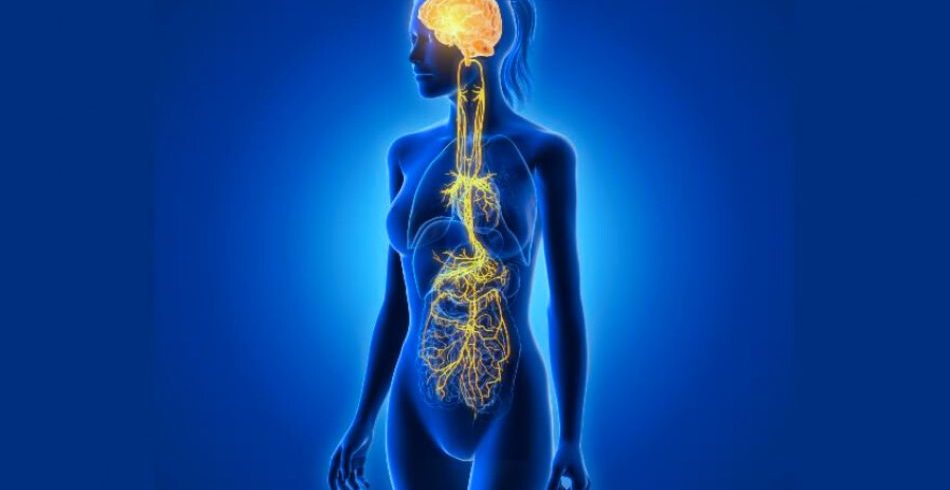
What is the vagus nerve and why is it important?
The vagus nerve is the largest cranial nerve in the human body, playing a vital role in our autonomic nervous system. This “wandering nerve” extends from the brainstem down to the abdomen, interacting with various organs, including the heart, lungs, and digestive tract.
As research gains momentum regarding its importance, awareness concerning vagus nerve disorders has significantly increased. These disorders can lead to debilitating symptoms, prompting the need for comprehensive understanding and proactive management.
Vagus Nerve Anatomy and Function
The vagus nerve comprises two major branches: the left and right vagus nerves, which connect the brain to multiple organs throughout the body. Its key functions include:
- Regulation of Heart Rate: The vagus nerve helps to slow the heart rate and manage blood pressure, primarily through its parasympathetic effects .
- Influencing Digestion: Vagus nerve signals stimulate digestive acid production and coordinate gut motility, facilitating the digestive process .
- Emotional Regulation: There is ample evidence linking vagal tone, a measure of the vagus nerve’s activity, to mental health. Studies show that higher vagal tone is associated with improved emotional regulation and decreased anxiety .
Understanding the fundamental anatomy and functions of the vagus nerve allows us to appreciate how its dysfunction can lead to a range of disorders.
Common Vagus Nerve Disorders
Several conditions can arise from vagus nerve dysfunction, manifesting various symptoms:
- Gastroparesis: This disorder is characterized by delayed gastric emptying, causing nausea, bloating, and abdominal discomfort. Common causes include diabetes mellitus and viral infections that impair nerve function .
- Vasovagal Syncope: This condition leads to fainting episodes caused by an overreaction of the vagus nerve to certain triggers such as stress, pain, or prolonged standing. During these episodes, a significant drop in heart rate and blood pressure occurs .
- Anxiety and Depression: Research links vagus nerve dysfunction to mood disorders. A study noted a correlation between low vagal tone and increased susceptibility to stress in adolescents.
- Irritable Bowel Syndrome (IBS): Dysregulation of the vagus nerve may contribute to IBS, characterized by gastrointestinal pain and altered bowel habits
Signs and symptoms of Vagus Nerve disorders
Recognizing potential symptoms of vagus nerve disorders is critical for early diagnosis:
- Cardiovascular Symptoms: Palpitations, abnormal heart rates, or lightheadedness can indicate issues with vagal function.
- Gastrointestinal Symptoms: Difficulty swallowing, nausea, acid reflux, and bloating may signal nerve dysfunction .
- Psychological Symptoms: Increased anxiety, depression, and emotional dysregulation can stem from inadequate vagal signaling .
- Physical Symptoms: Discomfort in the neck, fainting spells, and unexplained pain can also be associated with vagus nerve disorders.
- Headaches or migraines: Prolonged migraine headaches without a clear cause can be due to vagus nerve dysfunction.
What causes Vagus Nerve irritation?
Irritation of the vagus nerve can arise from various factors, including:
- Infections: Viral infections can damage the nerve, leading to gastroparesis.
- Physical Stress: Injuries or surgeries involving the neck or abdomen may irritate the vagus nerve.
- Gastrointestinal Disorders: Conditions like reflux esophagitis or infections can affect vagal function .
What happens when the Vagus Nerve Is overstimulated?
Overstimulation of the vagus nerve can lead to vasovagal syncope, resulting in severe fainting episodes . Patients may also experience changes in heart rate, gastrointestinal upset, or heightened anxiety responses.
How do they diagnose Vagus Nerve damage?
Vagus nerve damage can be diagnosed through:
- Electrophysiological Tests: Electromyography (EMG) determines the electrical activity of the nerve.
- Imaging Studies: MRIs and CT scans can reveal structural issues affecting the nerve .
- Symptom History: A detailed symptom history, coupled with physical examination, is crucial in identifying potential nerve dysfunction .
What is a Vagus Nerve attack?
A “vagus nerve attack” typically refers to a sudden episode of vasovagal syncope, marked by fainting due to a rapid decrease in heart rate and blood pressure triggered by the vagus nerve .
What are the symptoms of Vagus Nerve damage?
Symptoms associated with vagus nerve damage include:
- Abnormal heart rate (bradycardia or tachycardia)
- Difficulty swallowing (dysphagia)
- Nausea and vomiting
- Changes in appetite and digestion .
- Consistent migraines
- Extreme anxiety, stress or depression
Vagus Nerve and trauma
Trauma to the vagus nerve, either physical or psychological, can lead to long-lasting impacts on health. Physical trauma may directly damage the nerve, while psychological trauma can disrupt vagal signaling and function, contributing to mood disorders such as PTSD, increased chronic stress and anxiety.
Underactive Vagus Nerve
An underactive vagus nerve can lead to a condition known as low vagal tone, often resulting in:
- Increased stress responses
- Higher levels of anxiety and depression
- An impaired ability to regulate heart rate and blood pressure .
Symptoms of Vagus Nerve irritation
Symptoms of vagus nerve irritation can include:
- Severe abdominal pain
- Frequent fainting spells
- Heart palpitations
- Changes in mood, particularly increased anxiety .
Effective treatments for Vagus Nerve disorders
Effective management of vagus nerve disorders involves a multifaceted approach, integrating medical treatments, dietary adjustments, and lifestyle changes. These strategies aim to alleviate symptoms, improve quality of life, and restore optimal vagus nerve function.
Vagus Nerve Stimulation (VNS)
Vagus Nerve Stimulation (VNS) is a promising technique that involves the implantation of a device designed to deliver electrical impulses directly to the vagus nerve. This FDA-approved treatment has garnered considerable attention due to its efficacy in managing chronic conditions, particularly epilepsy and treatment-resistant depression.
How VNS Works
The VNS device is typically implanted under the skin of the chest, with a wire connecting it to the left vagus nerve in the neck. Upon activation, the device sends mild electrical pulses to the nerve, which then sends signals to various areas in the brain responsible for mood regulation, emotional processing, and seizure activity. The aim is to recalibrate the neural circuits involved in these processes.
- Efficacy in Epilepsy and Depression: Studies indicate that VNS can significantly reduce the number of seizures in patients with epilepsy. According to a study published in the journal Epilepsia, around 30% of patients experienced a 50% or greater reduction in seizure frequency with VNS . Furthermore, research has shown that VNS can help alleviate symptoms of major depression, particularly in cases where traditional antidepressants have failed. A meta-analysis demonstrated that VNS could yield a response rate of approximately 37% in depression patients .
Non-Invasive Vagus Nerve stimulation devices
In addition to the implantable device, researchers are exploring non-invasive alternatives that stimulate the vagus nerve without the need for surgery:
- Transcutaneous Vagus Nerve Stimulation (tVNS): This technique involves delivering electrical impulses to the auricular branch of the vagus nerve through the skin of the outer ear using a painless stimulation device. tVNS has shown promise in treating conditions like anxiety and chronic pain. A study in Comprehensive Psychiatry reported that tVNS could improve symptoms in patients with mood disorders.
- Ultrasound Stimulation Devices: Emerging technology utilizes ultrasound to stimulate the vagus nerve without invasive procedures. This approach offers a unique advantage by stimulating deeper tissues and activating vagal pathways more selectively. Preliminary studies suggest that ultrasound stimulation can enhance vagal activity and may have applications in treating conditions like depression and anxiety.
Feel the difference with the Pulsetto Non-invasive Vagus Nerve Stimulator: scientifically proven, user-approved, and beautifully portable for results that matter.
P.S. We tested the versions available on the market and Pulsetto is the best value for money in terms of efficiency, design and quality.
Potential side effects and considerations
While VNS is generally well-tolerated, potential side effects include:
- Hoarseness or changes in voice, due to nerve stimulation affecting vocal cords.
- Tingling or discomfort at the stimulation site.
- Short-term increases in anxiety during stimulation.
Patients should discuss these potential side effects with their healthcare providers to weigh the benefits against possible drawbacks.
Dietary adjustments
Diet plays a significant role in supporting vagus nerve function and overall gut health. Adopting a nutrient-rich diet can help bolster the body’s natural defenses and improve vagal tone.
- High-Fiber Diet: Fiber is crucial for maintaining gut health, which is intrinsically linked to vagus nerve function. Foods rich in fiber promote a healthy gut microbiome, which in turn can enhance vagal signaling. Aim to include whole grains, fruits, vegetables, and legumes in daily meals.
- Probiotics and Fermented Foods: Probiotics support a healthy balance of gut bacteria, contributing to improved gut health and vagal tone. Fermented foods such as yogurt, kefir, sauerkraut, and kimchi are excellent sources of beneficial bacteria. Multiple research published highlighted that a healthy microbiome positively influences mood and anxiety, possibly through the gut-brain connection facilitated by the vagus nerve .
- Foods Rich in Omega-3 Fatty Acids: Foods such as fatty fish (salmon, mackerel), flaxseeds, and walnuts are high in omega-3 fatty acids, which are known to support neural health and reduce inflammation. These nutrients may help enhance vagal tone, promoting better emotional regulation and lower levels of anxiety .
Lifestyle changes
Lifestyle modifications significantly impact vagal nerve function and overall health. These changes are often interconnected and contribute to a holistic approach to treatment:
- Regular Physical Activity: Engaging in regular cardiovascular exercise is one of the best ways to enhance vagal tone. Exercise promotes better heart rate variability (HRV), a measure of vagus nerve activity. Activities like walking, running, cycling, and swimming can stimulate the vagus nerve and reduce stressors that negatively affect its function .
- Mindfulness Practices: Mindfulness meditation, yoga, and deep-breathing exercises have been shown to improve vagal tone through heightened awareness and relaxation. Mindfulness practices, particularly those involving breath regulation, significantly increased vagal tone and reduced anxiety levels .
- Stress Management Techniques: Managing stress effectively is crucial for maintaining a healthy vagus nerve. Techniques such as progressive muscle relaxation, tai chi, and biofeedback can help regulate the autonomic nervous system and improve vagal function .
- Adequate Sleep: Quality sleep is essential for overall health, including the health of the vagus nerve. Sleep disruptions can impair vagal tone and exacerbate symptoms. Practicing good sleep hygiene, such as maintaining a regular sleep schedule and creating a restful sleep environment, can help improve sleep quality .
Conclusion
The vagus nerve is integral to maintaining various body functions. Understanding its significance and recognizing the symptoms of vagus nerve disorders is essential for timely intervention. Engaging with healthcare providers about treatment options can facilitate better health outcomes and encourage a proactive approach to managing these conditions.




